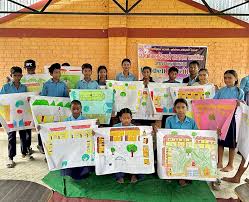Sparking smile: Lessons from a children’s elocution competition
From innovative tech-based ideas to timeless acts of kindness, the young participants presented thoughtful solutions that left me inspired about what truly makes us happy
Last week, I had the privilege of being on the panel of judges for an elocution competition for students, with the topic ‘The Perfect Solution to Make People Smile More.’ It was an intriguing subject-one very close to my heart-because I am the kind of person who smiles a lot. A lot more than people sometimes care to respond to or reciprocate. On the street, in the metro, in the building gallery, during my walk-almost anyone I can get eye contact with, whether stranger or friend, gets a smile. It is the most inexpensive gift I can offer, regardless of whether it is valued or not. It’s a heart-felt gesture that could be the very thing someone needs to make their day. The children who participated came up with some remarkable ideas-everything from making a smile a commodity that fetches monetary rewards or other tangible benefits to evoking emotional points that deeply resonated with the empathy in me. Given that the contest was called “Pitch Perfect,” the students brought forth many innovative concepts to make people smile, many of which revolved around technology. It was fascinating to imagine how new-age devices could inspire smiles, but I couldn’t help wondering-do we really need tools and gadgets to smile? Can’t we simply find natural reasons for it? Can’t we create genuine moments that make people’s eyes crinkle at the corners authentically?
As I waited for those ideas to unfold, I felt a gentle discomfort with the implicit belief that nothing happens these days without gadgets. But then came a few gems that emphasised the importance of compassion, empathy, and kindness as part of our daily lives-powerful ingredients for sparking smiles. This is what I want the younger generation to embody-an attitude that encourages them to be better people each day, spreading smiles through simple acts of kindness, rather than relying solely on innovations.
I was deeply moved by what some of the children shared. When I asked one young participant what act of kindness he had done that day to make someone smile or brighten their day, his answer was simple yet profound: “I told my mother how yummy the breakfast was, and it made her very happy.”
My takeaway from the experience was this: the new generation is competitive, full of energy to beat the odds and rise to the top in life. But it is also brimming with humaneness and rationality, qualities nurtured by the guidance of teachers, parents, and mentors. As they navigate the pressures of becoming super achievers, they still understand that the roots of happiness and peace lie in kindness and compassion. As is my habit, I often ask my students if they enjoy going to school and, if so, why. The answer I invariably hear is they like school not because of what they learn in class, but because of their friends. This sometimes makes me question my belief that schools and universities should be temples of learning-platforms for young minds to ignite and soar.
Their answer also makes me wonder if there’s more to be desired in how we mould our students. Have we focused too much on academic excellence at the cost of soul-nurturing education? Perhaps we need to spend less time teaching children skills to thrive in a competitive world and more time preparing them to be compassionate, kind-hearted individuals who bring joy to those around them.
This competition, with all its innovation and spirited energy, reminded me that the most profound solutions to making people smile often lie in the simplest of acts: a word of appreciation, a compliment, a smile shared.
As we look toward a future increasingly driven by technology, let’s not lose sight of what makes us truly human. It’s the little things that have the power to make the world a little brighter
